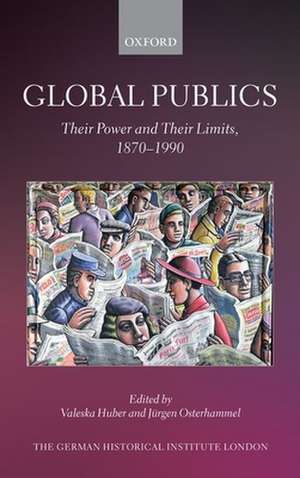Global Publics: Their Power and their Limits, 1870-1990: Studies of the German Historical Institute, London
Editat de Valeska Huber, Jürgen Osterhammelen Limba Engleză Hardback – 28 mai 2020
Preț: 1049.83 lei
Preț vechi: 1363.41 lei
-23% Nou
Puncte Express: 1575
Preț estimativ în valută:
200.89€ • 210.27$ • 167.20£
200.89€ • 210.27$ • 167.20£
Carte disponibilă
Livrare economică 10-24 martie
Preluare comenzi: 021 569.72.76
Specificații
ISBN-13: 9780198865773
ISBN-10: 0198865775
Pagini: 423
Dimensiuni: 146 x 222 x 28 mm
Greutate: 0.62 kg
Editura: OUP OXFORD
Colecția OUP Oxford
Seria Studies of the German Historical Institute, London
Locul publicării:Oxford, United Kingdom
ISBN-10: 0198865775
Pagini: 423
Dimensiuni: 146 x 222 x 28 mm
Greutate: 0.62 kg
Editura: OUP OXFORD
Colecția OUP Oxford
Seria Studies of the German Historical Institute, London
Locul publicării:Oxford, United Kingdom
Recenzii
I could not do justice here to the manifold merits and nuances of this fascinating volume, which has set the stage for a new field of research on global publics both conceptually and methodologically. It constitutes an instant classic for specialists and students in political history, media history, and global history.
It constitutes an instant classic for specialists and students in political history, media history, and global history
Global Publics is successful in stimulating conceptual discussion. Overall, the contributions make a strong case for using the notion of "global publics." Scholars working in the Habermasian tradition might be interested above all in Huber's and Osterhammel's introduction. Global historians may also want to turn to the essays: they present global publics as fractured and fragile, shaped by power structures and market forces, and only loosely coupled with visions of a global community or world citizenship. In particular, a focus on global publics seems to provide fresh perspectives for studying transnational forms of political mobilisation.
It constitutes an instant classic for specialists and students in political history, media history, and global history
Global Publics is successful in stimulating conceptual discussion. Overall, the contributions make a strong case for using the notion of "global publics." Scholars working in the Habermasian tradition might be interested above all in Huber's and Osterhammel's introduction. Global historians may also want to turn to the essays: they present global publics as fractured and fragile, shaped by power structures and market forces, and only loosely coupled with visions of a global community or world citizenship. In particular, a focus on global publics seems to provide fresh perspectives for studying transnational forms of political mobilisation.
Notă biografică
Valeska Huber is Head of the Emmy Noether Research Group Reaching the People: Communication and Global Orders in the Twentieth Century. She teaches Global History at the Free University Berlin.Jürgen Osterhammel is Emeritus Professor of History at the Freiburg Institute for Advanced Studies.








